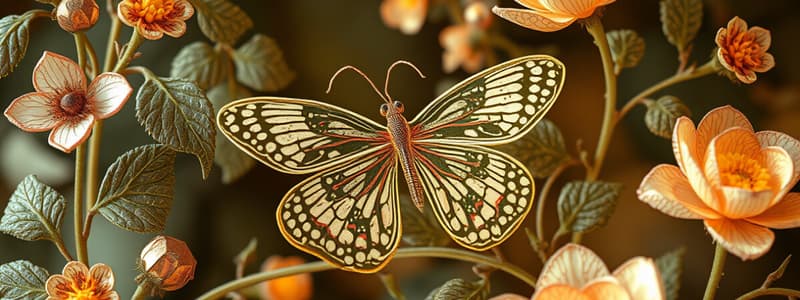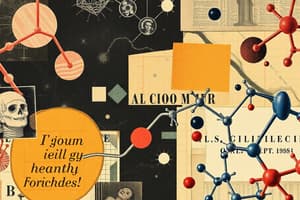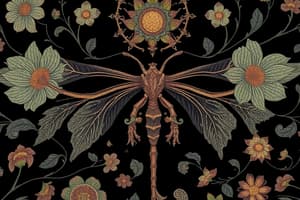Podcast
Questions and Answers
Who was the scientist that first coined the term 'cell' after observing a slice of cork under a microscope?
Who was the scientist that first coined the term 'cell' after observing a slice of cork under a microscope?
Robert Hooke
Which of the following is NOT a principle of the cell theory?
Which of the following is NOT a principle of the cell theory?
- Cells can spontaneously generate. (correct)
- All cells arise from pre-existing cells.
- The cell is the basic unit of life.
- All living organisms are composed of cells.
In a scenario where a bacterial cell divides into two identical daughter cells, which principle of the cell theory is being demonstrated?
In a scenario where a bacterial cell divides into two identical daughter cells, which principle of the cell theory is being demonstrated?
All cells arise from pre-existing cells.
Which scientist would most likely be credited for first observing dead cells under a microscope?
Which scientist would most likely be credited for first observing dead cells under a microscope?
Which cell organelle is known as the 'powerhouse' of the cell because it generates energy (ATP)?
Which cell organelle is known as the 'powerhouse' of the cell because it generates energy (ATP)?
In plant cells, which structure converts solar energy into chemical energy through photosynthesis?
In plant cells, which structure converts solar energy into chemical energy through photosynthesis?
Which organelle sorts, modifies, packages, and transports materials such as proteins in eukaryotic cells?
Which organelle sorts, modifies, packages, and transports materials such as proteins in eukaryotic cells?
What type of cell are you observing if it has no membrane-bound organelles and contains pili?
What type of cell are you observing if it has no membrane-bound organelles and contains pili?
What type of cell has a large central vacuole, a cell wall, and chloroplasts?
What type of cell has a large central vacuole, a cell wall, and chloroplasts?
Which organelle is responsible for producing food using solar energy?
Which organelle is responsible for producing food using solar energy?
How would you categorize a single-celled organism with a nucleus and membrane-bound organelles?
How would you categorize a single-celled organism with a nucleus and membrane-bound organelles?
What can you infer about a cell that has lysosomes actively breaking down waste and lacks chloroplasts?
What can you infer about a cell that has lysosomes actively breaking down waste and lacks chloroplasts?
Which of the following tissues provides structural support to the body?
Which of the following tissues provides structural support to the body?
What is the main function of red blood cells?
What is the main function of red blood cells?
Which type of connective tissue is directly impacted in a person with weakened bones?
Which type of connective tissue is directly impacted in a person with weakened bones?
Which type of muscle tissue is responsible for involuntary movements in the digestive system?
Which type of muscle tissue is responsible for involuntary movements in the digestive system?
Which type of tissue is most likely involved in repairing damaged skin?
Which type of tissue is most likely involved in repairing damaged skin?
Which tissue should treatment focus on for a patient with a severe infection and low white blood cell count?
Which tissue should treatment focus on for a patient with a severe infection and low white blood cell count?
What type of tissue would be the focus for a medical student evaluating a patient with chronic heart disease?
What type of tissue would be the focus for a medical student evaluating a patient with chronic heart disease?
Which of the following plant tissues is primarily responsible for gas exchange and water regulation?
Which of the following plant tissues is primarily responsible for gas exchange and water regulation?
What is the primary function of parenchyma cells in plants?
What is the primary function of parenchyma cells in plants?
Sclerenchyma cells are characterized by their:
Sclerenchyma cells are characterized by their:
Which plant tissue might be malfunctioning if a gardener notices leaves wilting despite regular watering?
Which plant tissue might be malfunctioning if a gardener notices leaves wilting despite regular watering?
What type of plant tissue is involved in the bending of a plant stem towards sunlight (phototropism)?
What type of plant tissue is involved in the bending of a plant stem towards sunlight (phototropism)?
Flashcards are hidden until you start studying
Study Notes
Cell Theory and Scientists
- Robert Hooke first coined the term "cell" through observations of cork.
- Transition from one cell to two identical daughter cells illustrates the principle that all cells arise from pre-existing cells.
- Anton van Leeuwenhoek observed microscopic life forms, while Robert Brown contributed to understanding cell structure.
- Rudolf Virchow posited that "omnis cellula e cellula," emphasizing cellular replication.
Organelles and Their Functions
- Mitochondria are known as the "powerhouse" of the cell, generating ATP through cellular respiration.
- Chloroplasts are responsible for photosynthesis in plant cells, converting solar energy into chemical energy.
- The Golgi apparatus modifies, sorts, and packages proteins and materials for transport.
- Lysosomes break down waste materials and pathogens; their activity indicates cellular cleansing processes.
Cell Types and Structures
- Prokaryotic cells lack membrane-bound organelles and can contain structures like pili.
- A plant cell is identified by a large central vacuole, cell wall, and chloroplasts, which aid in storage, structure, and photosynthesis.
- Eukaryotic cells, equipped with a nucleus and membrane-bound organelles, can be classified based on the presence of structures like flagella for mobility.
Tissue Types and Functions
- Connective tissue provides structural support; impaired functionality leads to conditions like bone weakness.
- Red blood cells primarily transport oxygen and aid in gas exchange.
- Smooth muscle tissue operates involuntarily, essential for digestive processes.
- Epithelial tissue is key in the repair and regeneration of skin and other surfaces.
Specific Cell and Tissue Responses
- A low white blood cell count indicates a focus on immune system-relevant tissue for treatment.
- Chronic heart disease involves muscle tissue, particularly cardiac muscle, which may malfunction.
- Epidermal tissue in plants regulates gas exchange and water, critical for overall plant health.
- Parenchyma cells are multifunctional, aiding in storage, photosynthesis, and tissue repair.
Plant Growth Responses
- Sclerenchyma cells feature thick, rigid walls, often dead at maturity, providing enhanced structural support.
- Malfunctioning vascular tissues like xylem can lead to wilting in plants despite adequate watering.
- Phototropism in plants, bending toward light, involves differential growth in specific plant tissues.
General Plant Adaptations
- Understanding plant tissue functions can contribute to breeding strategies, especially for drought resistance.
- Knowledge of physiological responses, like phototropism and tissue repair processes, enhances cultivation practices.
Studying That Suits You
Use AI to generate personalized quizzes and flashcards to suit your learning preferences.




